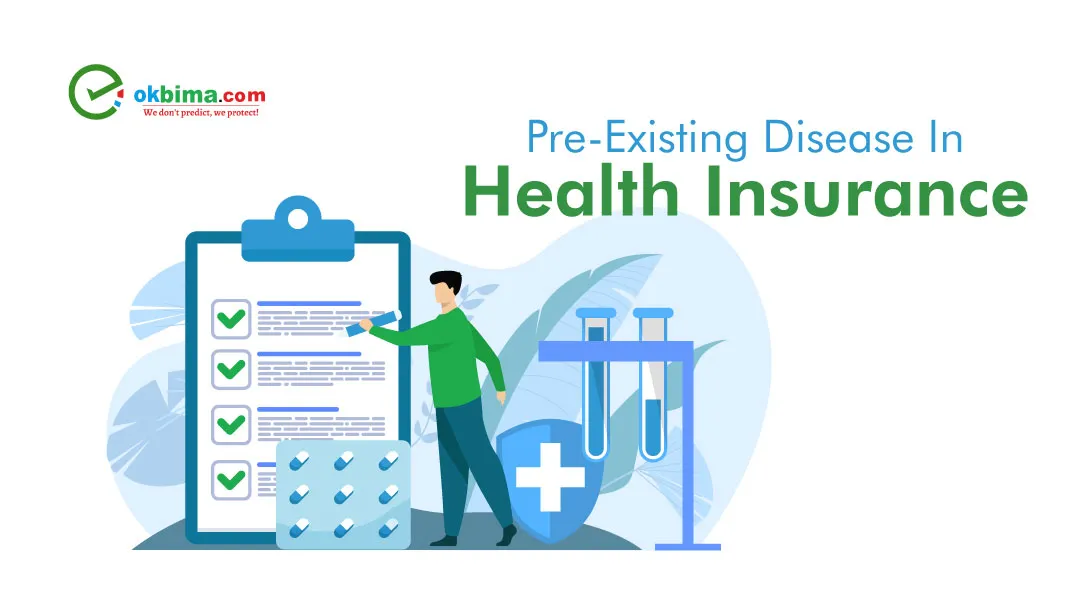

A health insurance plan offers benefits to reduce medical bills during emergencies. However, all health insurance plans have pre-existing disease criteria & It can be challenging to buy health insurance with pre-existing diseases. So, In this blog, we have covered its meaning, a list of covered diseases & some tips to buy the best health insurance plans easily.
In health insurance, a pre-existing disease is any medical condition that you have already been diagnosed with before you buy a health insurance policy. In India, the IRDAI defines a pre-existing condition as any illness or condition diagnosed up to 48 months (4 years) before buying the policy.
Here is the pre-existing diseases list which are covered in the health insurance plans in India such as Diabetes, Heart Disease, Cancer, Asthma, Arthritis, etc.
|
Category of Pre-Existing Condition |
Examples |
|---|---|
|
Chronic Diseases |
Diabetes, Heart Disease, Cancer, Asthma, Arthritis |
|
Mental Health Conditions |
Depression, Anxiety, Bipolar Disorder |
|
Neurological Disorders |
Alzheimer's Disease, Parkinson's Disease, Epilepsy |
|
Musculoskeletal Disorders |
Back Pain, Osteoporosis, Rheumatoid Arthritis |
Protect Your Financial Future With Health Insurance Plans: Get A Free Quote!
The waiting period in health insurance for pre-existing diseases is the time you have to wait after buying a policy before the health insurance companies will cover any medical expenses related to that condition. It's a common clause to manage risk for insurers. Most health insurance plans in India have a waiting period of 2 to 4 years for pre-existing diseases. This means any hospitalization or treatment costs related to a pre-existing condition won't be covered during this time.
However, some health insurance plans might have a shorter waiting period, like 6 months to 1 year, while others might have a longer one more than 4 years for specific diseases. Apart from the pre-existing disease clause, there's a general 30-day initial waiting period applicable to all claims in most policies. No claims are covered during this period, regardless of the condition.
Health insurance companies are focused on reducing the risk of paying for expensive medical treatments. Pre-existing conditions can be difficult for insurers because they require additional resources to cover.
Higher Costs: People with pre-existing conditions need medical care compared to healthy people. This can cost more to the insurance company in terms of covering treatment & medication.
Predictability: Insurance companies need to predict how much money they will have to pay out for medical costs. If people already have health problems, it's harder to predict how much their medical care will cost in the future.
Impact on Premiums: Covering pre-existing conditions can increase health insurance costs for everyone. This can increase costs for those who still have insurance.
Take Control Of Your Health: Compare Health Insurance Now!
A pre-existing disease can affect your health insurance like increased premiums, policy coverage, etc.
Increased Premiums: If you are already sick, you have to pay higher premiums because insurance companies can expect you to need more medical help.
Policy Coverage: Sometimes insurance companies may not cover a pre-existing condition if it is very serious or could cost a lot of money.
Limited Coverage Options: Some plans may only partially cover existing health conditions, and they don't have to pay for certain treatments, medicines, or hospital stays related to the condition.
Get Covered & Stay Protected: View Health Insurance Plans Online!
Below, we have mentioned some tips to buy health insurance plans, if you already have a pre-existing disease.
Research & compare different health insurance plans: Before buying health insurance, research & compare different plans to find one that offers coverage for your pre-existing disease at an affordable premium.
Disclose your pre-existing condition: Be honest about your pre-existing condition when applying for health insurance. Failure to disclose this information can denial of coverage or cancellation of your policy.
Look for a policy with waiting periods: Some health insurance plans may offer coverage for pre-existing conditions, but with a waiting period before benefits can be claimed.
Review the policy carefully: Before buying a health insurance plan, carefully review the policy terms & conditions, including coverage for your pre-existing condition, exclusions, deductibles, and copayments.
Read More:
Deductible In Insurance: Definition, Types & Factors Affect Deductible Amount
Best Senior Citizen Health Insurance Plans in India 2024
Government Health Insurance Schemes in India 2024
How Many Types of Health Insurance Plans In India?
Tax Benefits of Health Insurance Plans In India
In conclusion, having pre-existing disease makes it hard for people to get health insurance. Insurers may make them wait, pay more, or not cover their conditions. However, you can buy health insurance which may cost higher premiums and a minimum 30 days of waiting period. So, choose the best health insurance plans. For assistance, you can contact “Our Experts”.